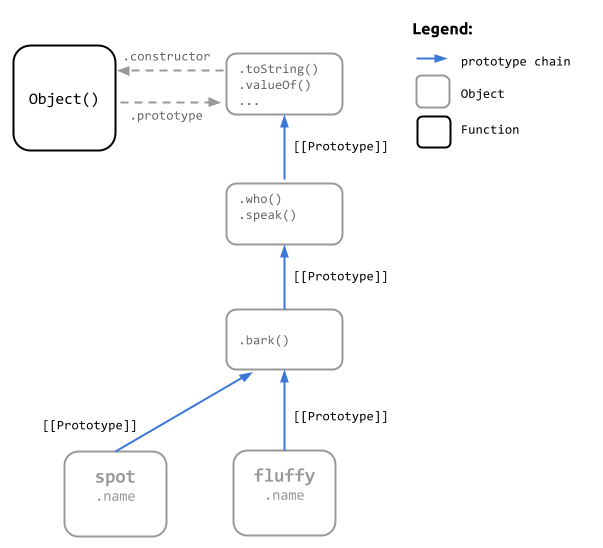Delegation using Object.create()
We used Object.create() above when creating the function prototypes. Object.create() does exactly what we really want - creating a linkage between objects by building an object based on another object.
So, maybe we can just use "plain objects", instead of constructor functions?
var foo = { a: 1 };
var bar = Object.create(foo);
bar.b = 2;
var baz = Object.create(bar);
baz.c = 3;
console.log("I can haz 'a' and 'b'? ", !!(baz.a && baz.b));
// true
Object.create() properly sets up the prototype linkage and gives us a new object; which we can then link to another object. We don't have to worry about instanceof because we're not using functions as constructors; nor do we have to deal with setting a .prototype or .constructor property correctly.
So let's go back to our Animal and Dog example and see how we would compose that same functionality using delegation through Object.create() instead of constructors.
We'll use Object.assign() to initialize the objects in the our chain. Most browsers don't support Object.assign() yet, so you can use this simple polyfill to run the examples:
if (!Object.prototype.assign) {
Object.prototype.assign = function() {
var args = [].slice.call(arguments),
target = args.shift();
return args.reduce(function(base, obj) {
Object.keys(obj).forEach(function(prop) {
if (obj.hasOwnProperty(prop)) {
base[prop] = obj[prop];
}
});
return base;
}, target);
}
}
The functionality we want to compose using delegation will be similar to our original; but delegation is a fundamentally different approach and pattern than inheritance.
- Delegation builds functionality by composing (via links) regular objects, not by using constructor functions.
- Delegation uses more specific method names on the delegator objects that are reflective of the actions they perform. Inheritance keeps method names fairly generic, as sub-classes tend to re-implement specific behavior that override the base classes method.
- State is typically maintained at the delegator level, not in the delegatee objects.
var Animal = {
who: function() { return this.name; },
speak: function(s) { console.log(this.who() + ": " + s); }
}
var Dog = Object.create(Animal, {
bark: {
value: function() { this.speak("woof!"); }
}
});
var spot = Object.assign(Object.create(Dog), { name: "Spot" });
var fluffy = Object.assign(Object.create(Dog), { name: "Fluffy" });
spot.bark();
fluffy.bark();
That's much less code; and here's the new mental model you'll have to grok. Much easier!

We're composing functionality here using Object.create(). And the bark() method of our Dog objects delegates to Animal.speak(), available via its prototype chain.
The approach with the delegation pattern is to use an object as a base "type" that contains common behavior and have other objects link to that object to use that functionality.
In many respects, what we're trying to do is simply compose behavior, not create types, like inheritance does. The relationship between two objects is explicit via composition using Object.create(), rather than implicit via an internal inheritance mechanism.
So, if we're wanting to really just compose behavior; and those behaviors might be common to a number of different objects, there is actually another pattern we can use: mixins.